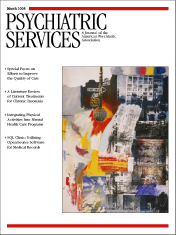In 1995, the Society of Health and Human Values (SHHV) and the Society of Bioethics Consultation (SBC) joined forces to review the state of health care ethics consultation in the United States. The report of this task force, "Core Competencies for Health Care Consultation" (
1), described in considerable detail the various skills, knowledge, and personal attributes necessary for effective ethics consultation. The modest 36-page report continues to fill an important gap for those who conduct ethics consultation, educational programs that prepare ethics consultants, and organizations that offer or are considering offering ethics consultation.
Ethics Consultation: From Theory to Practice can be viewed both as prequel and sequel to the SHHV-SBC report. All but one of its 20 contributors were also members of the task force (the report itself is included as an appendix), and the book is organized by the kinds of questions that readers of the report might find interesting: "Foundational and Theoretical Questions," "Practical Questions," and "Questions on the Horizon." As might be expected on the basis of the task force membership, the list of contributors reads like a who's who in American bioethics and accurately reflects the diversity and breadth of those who are currently practicing bioethics in the United States—sociology, nursing, law, medicine, philosophy, psychiatry, and even the Joint Commission on Accreditation of Healthcare Organizations are all represented in this book. Thus in this single volume the reader will find a great deal of current information about ethics consultation, ranging from a ground-breaking position paper authorized by the major professional organization in the field (the report was reviewed and adopted by the American Society for Bioethics and Humanities [the successor to the SHHV, the SBC, and the American Association of Bioethics] on May 8, 1998) to in-depth analyses of some of the theoretical assumptions that provide the basis for ethics consultation as well as contributions that both review and extend several ongoing debates—for example, whether organizational ethics should be part of bioethics and whether ethics consultants should be licensed.
However, before the practicing clinician adds ethics consultation to his or her reading list, a number of shortcomings should be considered. The collection is uneven, with some papers bordering on the self-evident. For example, do we really need to be told that approaches that are used to teach bioethics include face-to-face educational programs, distance learning, fellowships, certificates, and degree programs? Or that establishing an ethics consultation service requires "infrastructure support" in the form of time, space, and money? Nor do these articles represent the best discussions of ethics consultation in the literature: missing are papers that challenge the notion of a shared common morality (
2) or that propose creative alternative ways to envision the consultation process (
3) or discuss the "secondary gain" of having a visible, effective ethics consultation service (
4).
It is not clear for whom this book was published. Those who are already engaged in bioethics consultation will most likely be familiar with these authors and their work and, in any case, will find nothing new presented here, whereas those who are interested in learning how to become an ethics consultant arguably will be better served by the many bioethics textbooks that have appeared during the past 25 years. Finally, despite a section devoted to "foundational" questions, this book does not do justice to the wide variety of critiques that have arisen in response to the practice of ethics consultation. Jonathan Moreno's superb contribution to the book, "Can Ethics Consultation Be Saved? Ethics Consultation and Moral Consensus in a Democratic Society," comes closest, but even here, a reader might be better served by reading Moreno's 1995 book,
Deciding Together: Bioethics and Moral Consensus (
5).

